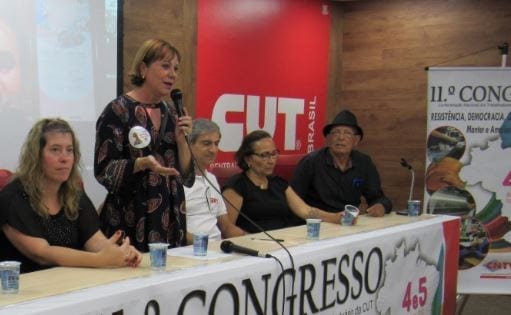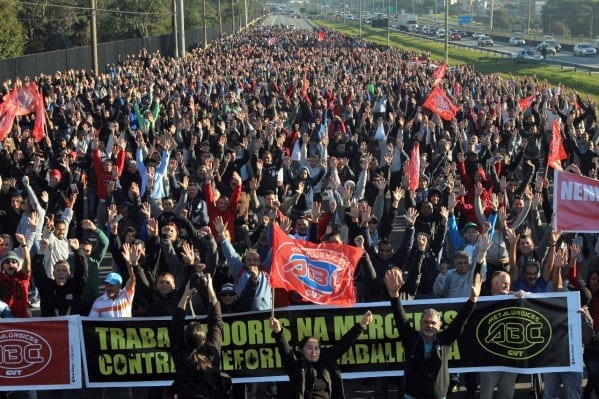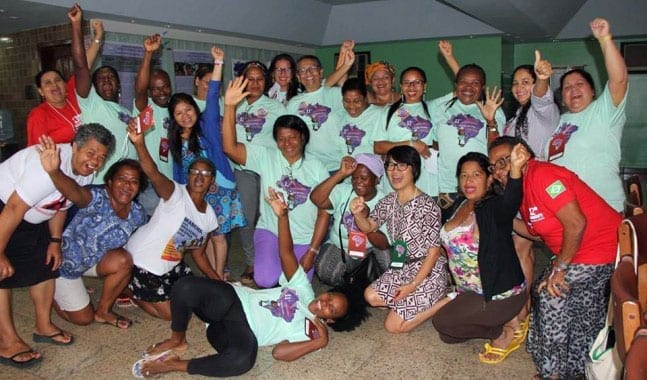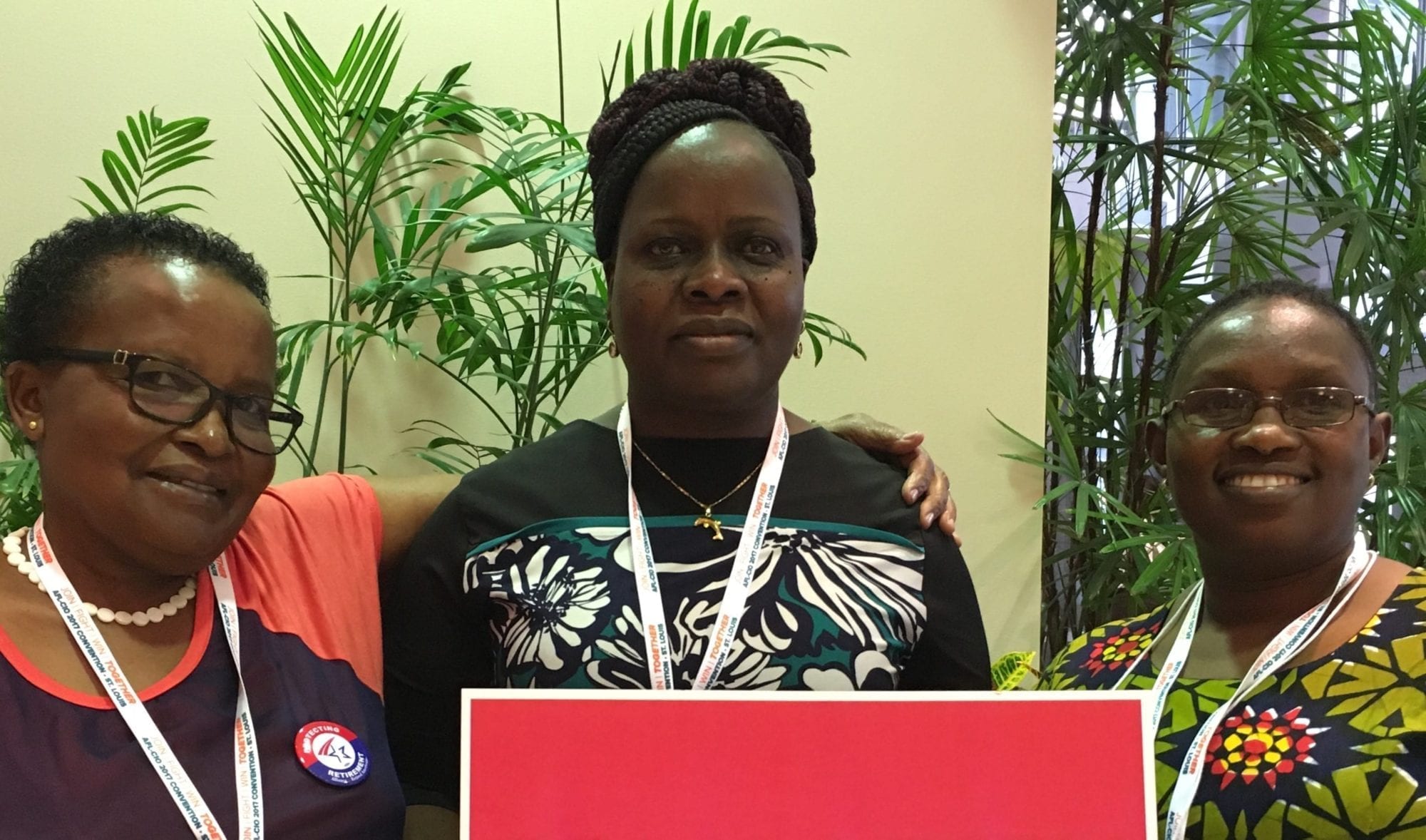
Apr 12, 2019
In a historic achievement, delegates to the 11th Congress of Brazil’s garment worker union federation, CNTRV (National Confederation of Clothing Workers) last week voted for gender parity in leadership and adopted a pro-women’s rights agenda.
The union achieved parity not only in the overall number of women and men in leadership, but also in its top executive positions.
“Women are empowered at the highest levels in the organization,” said CNTRV President Cida Trajano.
In partnership with the Solidarity Center, CNTRV in recent years ran a nationwide women’s leadership project, preparing women workers to assume leadership positions, according to Trajano.
“This is proof that the effort to form and organize feminist activism is worth it,” she said.
Over the next four years, CNTRV will focus on a pro-women’s rights agenda, including developing programs to combat gender-based violence at work and empower women workers; allow greater space for feminist agendas in communications; consult with women leaders and activists when developing recommendations for public policies affecting women; and expand women’s participation in collective bargaining and wage negotiations.
The Solidarity Center supports women workers seeking greater voice at the workplace across a range of employment sectors in Brazil, including the chemical, garment and hospitality industries, and domestic work. Together with the CNQ (National Confederation of Chemical Workers) CNTRV and CONTRACS (National Confederation of Service and Retail Workers), the Solidarity Center conducts trainings and campaigns to equip women to advocate for safer working conditions and more equitable salaries on the job, and to assume more active leadership roles in their unions.

Mar 15, 2019
Following the deadly mining dam collapse in January that buried alive 186 workers and residents of the town of Brumadinho, Brazil, and concurrent legislative attacks on worker rights, unions representing members across Brazil are requesting the Inter-American Commission on Human Rights (IACHR) investigate and address both issues.
The Vale-owned dam, which sat above Brumadinho, was held back by little more than walls of sand and silt, and is among 87 similarly constructed mining dams in the country. More than 131 people have not been found, and the “tidal wave of waste and mud that engulfed homes, businesses and residents” also wreaked enormous damage to the environment. The United Nations has said the disaster “must be investigated as a crime.”
The Brumadinho collapse, one of the worst mining disasters in the country’s history, follows a 2015 iron-ore dam collapse at another Vale mine that killed 19 people. Both catastrophes are the direct result of the privatization of Brazilian companies, a process that often results in precarious and dangerous working conditions, says Maximiliano Nagl Garcez, an attorney representing the unions.
Privatization in Brazil’s strategic sectors “means disrespect for international treaties, a threat to the country’s national and energy sovereignty and, above all, an enormous risk to the health and safety of thousands of workers at risk with negligence to their condition, to the detriment of an ever-increasing profit in the interests of large multinationals,” he says. Garcez will present the unions’ requests for investigations during the IACHR meeting in Jamaica in May.
Attacks on Worker Rights, Environment Connected
The mining collapse took place in an environment of stepped-up legislative attacks on land, community and worker rights, including the abolition of Brazil’s Labor Ministry and the transfer of oversight of indigenous lands and the forestry service to the Agriculture Ministry.
Most recently, the government enacted a “temporary law,” a measure typically reserved for emergencies, that changes the process of union dues collection. The impact of the new law is clear, says Garcez: It will destroy the financial viability of trade unions, undercutting their ability to effectively oppose the anti-worker government. These and other measures are a direct threat to workers’ right to freedom to form unions, he says.
The Central Union of Workers in Brazil (CUT) and other unions and organizations are requesting the IACHR address the attacks on worker rights, and Garcez requested hearings during upcoming IACHR investigations.
The Brazilian Bar Association this week challenged the measure to change union dues collection, and the country’s supreme court will hold a hearing on its constitutionality next week.

Feb 8, 2018
Following years of campaigning by domestic workers and their allies across Brazil, the government in recent days ratified the International Labor Organization Domestic Workers Convention (No. 189), a binding standard in which domestic workers are entitled to full labor rights, including those covering work hours, overtime pay, safety and health standards and paid leave. Brazil is the twenty-fifth country to ratify Convention 189 and the fourteenth in the Americas region.
Since the ILO passed the convention in 2011, the National Federation of Domestic Workers (FENATRAD), the National Confederation of Retail and Service Workers (CONTRACS) and the Central Union of Workers (CUT) were among unions pushing for its ratification, ultimately securing 1.2 million signatures urging the government to ratify the measure.
In a statement celebrating ratification, FENATRAD also vows to continue in the “daily struggle for dignity, valorization and recognition of domestic work, work that moves and creates conditions for other workers to dedicate themselves to productive activities.”
Brazil Economy Slumps as Labor Rights Attacked
The majority of the 7 million domestic workers in Brazil are women, primarily indigenous people and Afro-Brazilians. Brazil’s slumping economy has seen a sharp increase of workers in the informal-sector jobs, with 121,000 domestic worker jobs created between December 2014 and April 2017. At the same time, more than 3.2 million jobs were lost in the formal private sector and some 600,000 jobs lost in the public sector, according to the Department of Statistics and Socioeconomic Studies in Brazil (DIEESE).
Further, more than 9 million people have been pushed below the poverty line since 2015 and 800,000 Brazilians entered the ranks of the unemployed between January and August 2017.
Although workers are celebrating passage of the Domestic Workers Convention, they say a labor reform law passed last year severely weakens their fundamental rights on the job. The law in part dismantles provisions on overtime pay and working hours; creates new forms of precarious contracting, such as “zero-hour” contracts that do not guarantee a minimum wage; and permits pregnant women and breastfeeding mothers to work in unhealthy environments.
The law also disproportionately impacts historically disadvantaged workers, such as women and Afro-Brazilians, who earn less and are much more likely to be unemployed or underemployed than their white male counterparts.
“The convention is to guarantee decent work, unlike the new law that removes basic rights of the worker and the worker,” says Myllena Calazans, a lawyer with FENATRAD.
With Solidarity Center support, FENATRAD recently registered as a national federation, became a member of the International Domestic Workers Federation (IDWF) and is connecting with regional domestic worker organizations.
The Solidarity Center is also assisting the federation in education and outreach, including creation of a crossword puzzle magazine that informs Brazilian domestic workers about their rights. Many domestic workers spend numerous hours on public transportation commuting to and from work and do crossword puzzles during their commutes.

Dec 23, 2017
As part of our year in review series, we are highlighting the 12 most popular Solidarity Center web stories of 2017. This story received the most reach on our Facebook page in July. Read the full story here.
Brazil workers and their unions are outraged and vowing further protests over a draconian labor law reform the Senate passed yesterday that will weaken labor regulations as well as restrict financing for unions.

Dec 20, 2017
As part of our year in review series, we are highlighting the 12 most popular Solidarity Center web stories of 2017. This story received the most reach on our Facebook page in October. Read the full story here.
When Rose Omamo started work in 1988 as a mechanic in a vehicle assembly plant in Kenya, she was one of two women in a workplace dominated by hundreds of men. Her employer refused to recognize the women’s basic requests, and even her union, the Amalgamated Union of Kenya Metal Workers, negotiated contracts that excluded their concerns.




